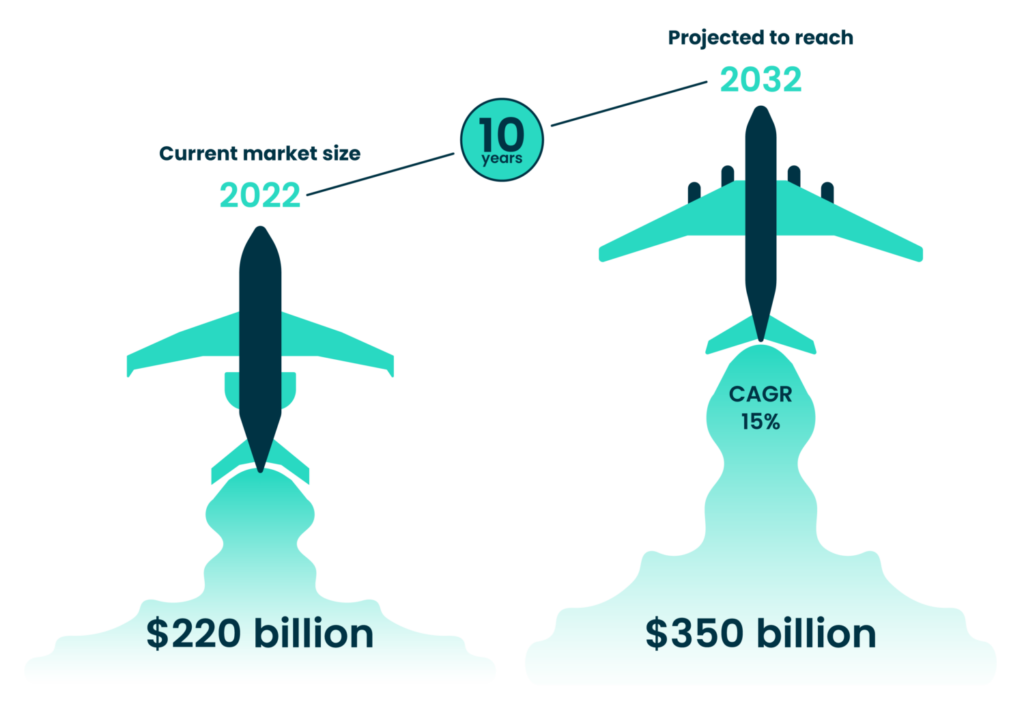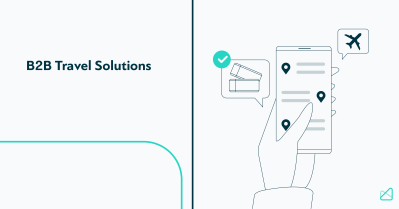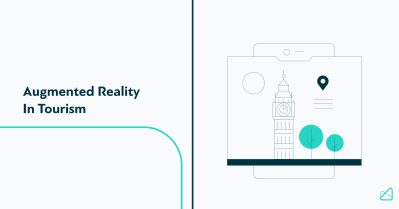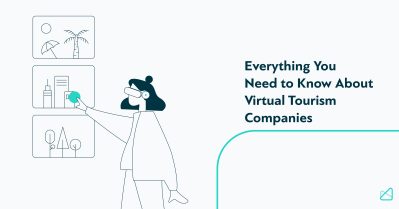Data Analytics in Tourism Industry: What Is It, Benefits, How It’s Used, & Real-life Examples

- What is data analytics in tourism?
- Why is Data analytics important for the tourism industry?
- What are the benefits of having data analytics in the tourism industry?
- How are data science and big data used in tourism industry analytics?
- Real-life examples of data science usage in the tourism industry
- How can descriptive analytics help travel agencies?
- Conclusion
Big data and data analytics are most commonly tied with industries such as fintech and IT. However, a few years ago, they also made it into the travel sector. They didn’t just make it into the industry. The enormous adoption rates of data analytics in the sector have created a brand new market – the tourism industry and the big data analytics market.
This market’s size reached $220 billion in 2022, and it’s projected to reach $350 billion by 2032. We are talking about a CAGR of 15% here, which is huge!

If you are interested in whether big data and data analytics can benefit your business, you need to learn more about these concepts. Below you will find everything you need to assess their value, including real-life examples.
What is data analytics in tourism?
The best way to understand data analytics in tourism is to understand the concept of data analytics.
Data analytics is a domain of data science. It refers to various processes and techniques developed to streamline raw data analysis. Its primary purpose is to help you make sense of data and use it to make informed conclusions and decisions.
Over the years, these processes and techniques have been successfully automated thanks to sophisticated algorithms. The travel sector can now efficiently utilize different types of data analytics.
They can analyze data to see exactly what happened, called descriptive analytics. They can understand why something occurred thanks to diagnostic analytics. Alternatively, they can identify what will happen and what to do next, thanks to predictive and prescriptive analytics.
The data fed to data analytics algorithms is called big data. It only takes a quick literature review to find out the big data definition:
“Big data refers to data sets that are too large or complex to be dealt with by traditional data-processing application software. It enables companies to do at a large scale that cannot be done at a smaller one, to extract new insights or create new forms of value, in ways that change markets, organizations, and more.”
Why is Data analytics important for the tourism industry?
The role of data analytics in the tourism and hospitality industry is becoming increasingly important with every passing year. Thanks to new IT technologies, companies in the travel sector can now efficiently track, record, store, and process big data, which enables even small companies to benefit from cutting-edge solutions.
Advances in cloud technologies and infrastructure that support big data and data analytics enabled service providers to decrease costs. It simply means that the travel sector can now use big data in a cost-efficient manner.
Data analytics unlocks many opportunities for travel companies. First and foremost, it allows people who are not data science experts to quickly review large-scale volumes of data. That is important because most of the touch points consumers have with travel businesses are now online, and each one produces some data.
Big data and analytics can finally equip travel companies with everything they need to understand their target customers and capture more profit – or, in other words, gain a competitive advantage.
At the same time, your business also generates internal data. Data analytics is essential because you can truly understand your business processes and how your company interacts with partners and customers.
What are the benefits of having data analytics in the tourism industry?
Many scientific papers are trying to put a finger on the benefits data analytics unlocks for the tourism industry. While there are some subtle differences, all papers find out that big data, data analytics, ML, and AI-enabled strategies help unlock the following benefits.
Thanks to data analytics tools, travel agencies and tour operators can now better understand their markets. They can gauge the market performance to adopt new strategies or refine new ones to achieve more optimal results.
They can better understand their customers and prospects as well. They can identify customer behavior patterns and customize their offer to reflect the current demand to attract more consumers and boost sales.
Data analytics can also help companies put their operations under a microscope. They can analyze the data they generate internally. It can help them achieve operational excellence, reduce operational costs, and make informed customization decisions to facilitate work for their staff.
Data analytics also enables companies to gauge their supply chains. It allows them to source their products in a smarter and more informed manner, thus potentially increasing profit margins while still staying competitive within their markets.
They can ultimately adopt new strategies to generate new revenue streams, maximize profits, and establish a better positioning within a target market.
How are data science and big data used in tourism industry analytics?
Data science and big data have found many use cases in the tourism industry analytics. Travel organizations of all sizes are collecting and storing copious amounts of data. Some do it passively as their processes generate data.
For instance, their website can automatically collect data with Google Analytics to facilitate web analytics. They can also store interactions with customers and previous purchase history to personalize service and offer relevant products to consumers.
Others adopt a more active approach, engaging in data-gathering activities such as data mining. It can help them optimize pricing strategies or identify viable marketing channels for specific markets.
The primary role of big data in tourism industry analytics is to enable an accurate decision-making process. Proving accurate, updated, and structured data is paramount in this instance, as the quality analytics outcomes depend on all these factors.
In one study, scientists decided to further examine the impact of the rise of big data and analytics in the travel sector. They found out that most companies that adopt these new technologies do it because access to actionable data enables them to increase sales revenue, improve marketing initiatives, and get a competitive advantage.
One of the recent studies provides a systematic review of the big data use cases in the tourism industry. According to this study, the companies in the sector are using big data to:
- Custom-tailor travel products to meet the needs of market/audience segments;
- Improve cyber-security to enhance the travel experience;
- Create new value by espousing different types of interest;
- Gauge customer sentiment and identify factors of positive and negative engagement on social media.
Real-life examples of data science usage in the tourism industry
Understanding data science, data analytics, and big data can be challenging, given that these are all new concepts. The best way to do it is to review some of the use cases. Below you can find real-life examples of data science usage in the tourism industry.
Venice and Salzburg as perfect examples of smart tourism destination
Smart tourism destination is a brand new kind of destination. It refers to destinations that heavily rely on technology to enhance their competitiveness, favor tourism development projects, and improve tourism experiences. These destinations promote the use of technology and capture consumers’ data to fine-tune their offers to deliver delightful experiences to tourists.
The two examples of smart tourism destinations in practice are Venice and Salzburg, as outlined in this study. Using data analytics to model the experience process while visiting Venice and Salzburg helped define destination boundaries and better manage destination stakeholders.
These two destinations managed to improve the co-creation of tourism experiences, be more sustainable and competitive, and promote sustainable tourism and sector development.
Fareboom’s success with the fare predictor tool
Freboom is one of the world’s most popular online travel agencies. They decided that big data and analytics could help them improve their travel booking website by offering attractive prices. To do it, they implemented a fare predictor tool.
The fare predictor tool uses a self-learning algorithm and goes through millions of website fare search records. The algorithm used factors such as demand growth and seasonal trends to predict future price movements, with a confidence rate of 75%. The final results are outstanding as the tool increased the average time a person spends on the Fareboom site by 100%.
Booking.com uses predictive analytics across departments
Booking.com doesn’t require a formal introduction as it’s one of the world’s largest travel marketplaces. When it comes to data analytics, Booking.com might just be a perfect example. Why? Because the company uses it to enable all its departments to make timely and informed decisions.
In one of the recent interviews, Lukas Vermeer, a data scientist at Booking.com, revealed that the company uses data analytics in web marketing, attribution models, ROI predictions, recommendation systems, call volume predictions, and scheduling algorithms.
Mini Cambodian hotel uses big data as a starting point for hotel management
Mini-hotel in Cambodia decided to step up the hotel management strategy by using big data and data analytics. Their goal was to develop a new, more competitive, and cost-effective hotel management strategy. They started using one of the world’s top analytics tools to collect valuable data, including sales statistics, the booker’s country of origin, travel purpose, the device to book, and cancelation details, among others.
The case study reveals that big data and data analytics can be used as a starting point for improving hotel management strategies. In this case, big data enabled the hotel owner to identify new opportunities, find out means to pursue them in the most efficient manner, identify new areas of potential growth, and monitor the effect of the new strategy.
Hyatt’s intelligent virtual assistant and data analytics save the company $4.4 million
Hyatt is one of the largest hospitality companies out there. It handles hundreds of thousands of calls per month. Since it became borderline impossible to provide a great customer experience using only human assistants and agents, the company decided to deploy an intelligent virtual assistant.
The virtual assistant’s role was to automate the new reservation process, transfer callers, and automate, confirm, and cancel reservations. More importantly, it could collect data and feed it to the data analytics engine. Thanks to automation and data analytics, Hyatt reduced contact center costs by 33% and saved 94% on fully automated interactions which roughly translates into $4.4 million.
Qantas airline significantly reduced the number and length of delays thanks to data analytics
As one of the world’s most reputable airlines, Qantas wanted to improve its schedule recovery to provide nothing but the best transportation experience to consumers. To do it, the company decided to make use of data. They invested in a schedule recovery solution that uses real-time data analytics to provide instant insights.
The results were outstanding. Qantas was able to assess all aspects of the operational costs, reduce the number and length of delays, and significantly reduce the cost of managing flight disruptions, whether due to weather conditions, excessive traffic, or unforeseen operational delays.
How can descriptive analytics help travel agencies?
As we’ve previously stated, descriptive analytics provides answers to the “What happened” question. It can include various historical data types, but it can also be applied to data streams in real-time. With this in mind, descriptive analytics can help travel agencies in many ways:
- Better understand customers – a travel agency can track numerous behavioral metrics to truly understand customers and their preferences. Thanks to these insights, you can easily personalize your offer in a cost-efficient manner;
- Improve brand image – descriptive analytics can help travel agencies manage their brand reputation. They can mine data from social media platforms to gauge customer sentiment, respond to
- Dynamic pricing management – imagine being able to adjust prices in real-time based on the supply, demand, and competitors’ prices. That’s precisely what descriptive analytics can offer to travel agencies of all sizes;
- Smart route optimization – cross-referencing logistics with customer behavioral data can help travel agencies further delight customers and make traveling more convenient. Smart route optimization refers to identifying and offering the most optimal flight and travel routes to customers;
- Make travel safer for everyone – fintech companies are already using descriptive analytics to detect frauds and anomalies in their transaction data sets. Travel companies can do it too to offer additional protection to their customers. With predictive analytics, they can easily detect unauthorized payments and stolen accounts.
Conclusion
Data analytics has found many applications in the travel sector. It can offer actionable insights and streamline the decision-making process, and many organizations are already using solutions with built-in data analytics capabilities.
They have various goals ranging from improving customers’ experience to maximizing profits. Given that the tourism industry and big data analytics market are projected to continue to grow, the chances are that we are going to see even more use cases of data analytics in the sector.
Subscribe to
our newsletter
Yay! You are now
subscribed to our
newsletter
Mize is the leading hotel booking optimization solution in the world. With over 170 partners using our fintech products, Mize creates new extra profit for the hotel booking industry using its fully automated proprietary technology and has generated hundreds of millions of dollars in revenue across its suite of products for its partners. Mize was founded in 2016 with its headquarters in Tel Aviv and offices worldwide.
Related Posts

Your Ultimate Guide to B2B Travel Solutions
17 min. You’ve probably noticed that B2B travel solutions play a vital role in the global B2B travel sector. We are talking about the market bound to reach the size of $4952.96 by 2028. That’s a CAGR Growth of 17.51%. No wonder leading B2B travel solutions process over 80.000 bookings and 14.000 searches a day. […]

5 Ways Augmented Reality is Enhancing the Tourism Experience
20 min. Augmented reality (AR) can truly transform the way people discover and explore new places. By combining physical exploration with digital elements, travelers are able to gain deeper insights into different cultures while making memories along the way. In today’s world, more and more travelers are turning to technology to add excitement and convenience […]

Everything You Need to Know About Virtual Tourism Companies
24 min. Virtual tourism refers to a specific tourism niche using technology that enables travelers to experience activities, locations, and destinations without leaving their homes. The types of virtual tours depend on the multimedia format offered to travelers. It can be anything ranging from still images, video, and audio to interactive virtual reality. The popularity […]
